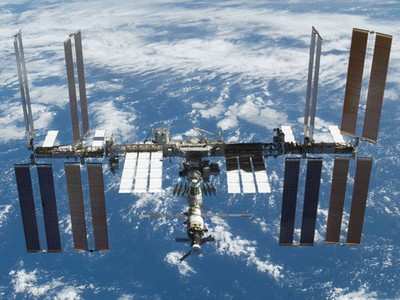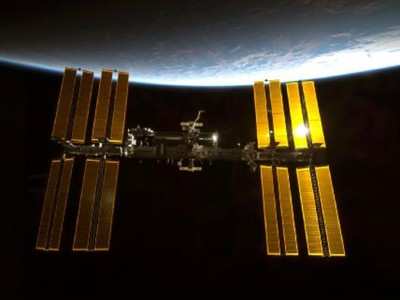Thu, Apr 28, 2011
Pledges To Support ISS Operation Until At Least 2020
The Multilateral Coordination Board (MCB) for the International
Space Station partner agencies met Wednesday, April 27, to discuss
increased efforts to use the station as a test-bed for exploration.
The MCB also congratulated the European Space Agency (ESA) on its
recent decision to continue station operations to at least
2020.

The MCB is working diligently to extend the benefits to future
exploration beyond low-Earth orbit through enhanced station
research, technology development and other opportunities. Other
topics on the agenda included a report on efforts to create
international standards for docking and berthing; rendezvous and
proximity operations; interfaces for replaceable items and
payloads; and standardization of command protocols for
spacecraft.
Station research with potential societal impact includes:
- The Alpha Magnetic Spectrometer-2, which will fly aboard
STS-134, scheduled to launch on April 29. The experiment is a
cosmic ray detector that will search for dark matter and
antimatter, components critical to understanding the origin and
structure of our universe.
- The Canadian Space Agency (CSA) continues its life science
research program on mitigating health risks associated with
spaceflight. These health experiments and activities will monitor
crew health and deliver health care on space missions.
- ESA began the GeoFlow experiment in the Fluid Science
Laboratory payload. This experiment will take advantage of the
microgravity environment on the station in combination with
electrical fields, thermal gradients and rotation to simulate many
parameters of geo-physical flows under the Earth's crust. Results
will help scientists understand thermal convection in planets and
the outer shells of celestial bodies. It also will verify numerical
simulations of fluid dynamics of liquid core planets with real
experimental data.
- Roscosmos, the Russian Federal Space Agency, continues
experimental programs aimed at human adaptation to future long-
term expeditions. Dedicated medical experiments study the effects
of flight conditions on the cardiovascular system, respiratory
system and bones. Other research includes planting wheat and
vegetables them performing genetic, microbiological and biochemical
tests on the plants.
- Japan has found several new X-ray celestial bodies by the
Monitor of All-sky X-ray Image instrument of "Kibo" and recently
reported the new gamma rays outburst of the Whale or Cetus. This
discovery will contribute to understanding the origin and the
evolution of the universe. Japan has also implemented a new
investigation on cucumber seedlings to study how plants sense
gravity as an environmental signal and use it for governing their
structural development and growth orientation.

The governments of Japan and the Russian Federation already have
approved continued station operations beyond 2016. NASA received
approval in the NASA Authorization Act of 2010. CSA is working with
its government to reach consensus about the continuation of the
station.
The MCB includes senior representatives from NASA, CSA, ESA,
Roscosmos and the Japanese Ministry of Education, Culture, Sports,
Science and Technology. The MCB meets periodically to ensure
coordination of station operations and activities among the
partners.
More News
He Attempted To Restart The Engine Three Times. On The Third Restart Attempt, He Noticed That Flames Were Coming Out From The Right Wing Near The Fuel Cap Analysis: The pilot repor>[...]
Make Sure You NEVER Miss A New Story From Aero-News Network Do you ever feel like you never see posts from a certain person or page on Facebook or Instagram? Here’s how you c>[...]
From 2009 (YouTube Edition): Leading Air Show Performers Give Their Best Advice for Newcomers On December 6th through December 9th, the Paris Las Vegas Hotel hosted over 1,500 air >[...]
Aero Linx: NASA ASRS ASRS captures confidential reports, analyzes the resulting aviation safety data, and disseminates vital information to the aviation community. The ASRS is an i>[...]
“For our inaugural Pylon Racing Seminar in Roswell, we were thrilled to certify 60 pilots across our six closed-course pylon race classes. Not only did this year’s PRS >[...]
 NTSB Final Report: Rutan Long-EZ
NTSB Final Report: Rutan Long-EZ ANN FAQ: Turn On Post Notifications
ANN FAQ: Turn On Post Notifications Classic Aero-TV: ICAS Perspectives - Advice for New Air Show Performers
Classic Aero-TV: ICAS Perspectives - Advice for New Air Show Performers ANN's Daily Aero-Linx (06.28.25)
ANN's Daily Aero-Linx (06.28.25) Aero-News: Quote of the Day (06.28.25)
Aero-News: Quote of the Day (06.28.25)




